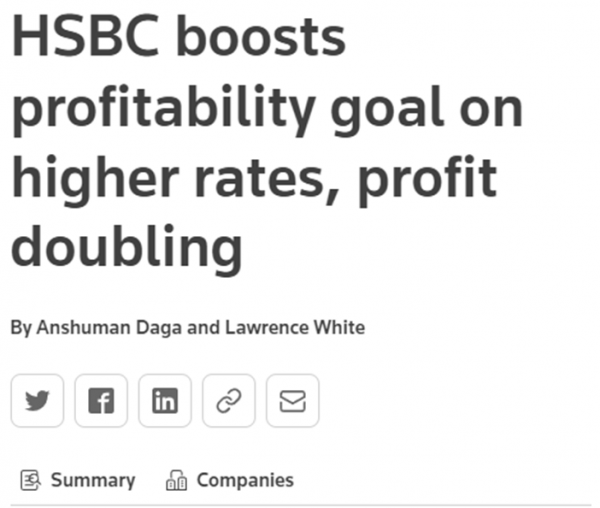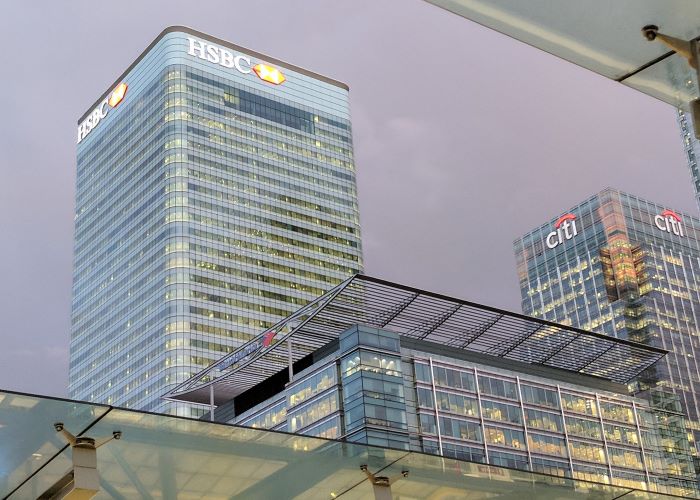If you would like to receive weekly updates like this, sign up here.
Not to put too fine a point on it…But I love it when a plan comes together!
I had someone send me an article on the Reuters website recently.
It spoke volumes to me. See below.
 Source: Reuters
Source: Reuters
Now for context, HSBC stands for The Hong Kong and Shanghai Banking Corporation Limited.
That’s right, it’s a bank.
And I have spoken at length over the last few blogs to you about just how important it is we begin watching the banks closely, right across the globe.
Now granted, the article the above headline comes from isn’t a particularly long one.
But within it are a few sentences that, for those in the know, are utterly profound.
You absolutely need to understand the implications here.
So, let’s look at them.
Who says rising interest rates are bad?
Anyway, back to my plan.
As mentioned previously, I have written to you about the importance of banks.
They were always going to be vital to assist every modern economy once the COVID lockdowns were wound back.
The game plan was always the fact that credit creation is the “go-to” process to fund all the things that governments wanted to finance to fast-track the recovery.
And therefore, such priming of the credit spigots would lead to increased earnings.
So, all I had to do was wait.
For what?
From the Reuters article (emphasis added by me).
HSBC brought forward its key profitability target by a year and more than doubled its annual profit as expected bad loans from the COVID-19 pandemic failed to materialize, and it pointed to rising interest rates lifting its income.
Like global peers, HSBC, one of Europe’s largest banks, is taking advantage of lower-than-expected impairment charges as its borrowers reap the benefit of government support in markets hit by coronavirus, while economic recovery also helps firms.
Oh boy, so much said with so few words.
Sure, it’s quite easy to understand as short and long dated rates begin to creep higher the margins for banks increase.
But its telling that the bank itself admitted a lower-than-expected bad loan provisions.
How come?
Yet another argument made by both me and everyone here at Property Sharemarket Economics (PSE) was unequivocal on this.
And that was all the liquidity pumped into economies all around the world as shutdowns were rolled out were specifically targeted at supporting the land market.
At the time, that was a point of view that a lot of people would take issue with, particularly back in the dark days of 2020 when we made that call.
Well, there’s your proof, from the mouth of the bank itself.
However, I’m not interested in seeking ‘credit’ for that. It was simply what more than 200 years of real estate cycle history taught me.
The way governments act when under pressure in a rent enclosed society.
Hence the borrowers mentioned above were mortgage holders. The prime and intended target for this stimulus.
Not that you or I were told that at the time.
But that was then, our concern is what’s ahead.
There’s lot of talk about how central banks around the world need to move today to head off the so-called persistent inflation we are dealing with.
The case presented is that rates must start rising.
In a jaw-dropping admission, the banks welcome such a move.
It said that if central bank interest rates rose worldwide as expected, the resulting improvement in lending margins would meet its goal of a double-digit return on equity in 2023, a year sooner than expected.
Next on the agenda for a bank like HSBC is the lucrative wealth management sector throughout Asia as their economies begin to ramp up.
The first of many.
I can assure you; what HSBC reported here is about to be echoed by a whole slew of international banks.
It’s why they make such compelling investments.
We are about to enter a window of opportunity right across the globe to make outsized gains via exposure to them.
But it won’t last forever.
Because the entire business model of the banking system, at least in the western world, is about to undergo a fundamental change.
Sure, re-entering wealth management makes sense, but the real prize for the biggest banks lies elsewhere.
It’s in financing the speculative part of the land market. And frankly, that adventure hasn’t really got started yet.
But history shows us it becomes so overwhelmingly lucrative that any bank not involved in mortgages up to their eyeballs will have their CEOs removed and face stern pressure from displeased shareholders.
And in this cycle, we may have serious competition for market share that these banks have never faced before.
It is entirely plausible, even probable, that the tech behemoths like Apple, Microsoft, Amazon, and the like begin to offer their own lending products into the market.
Many of them face headwinds over anti-copyright laws and shifting taxable profits around the globe to avoid paying them. Already this is causing pressure on earnings and thus a falling share price.
What a terrific way to re-energize those pressured earnings than taking the plunge into property lending.
Right as the speculative peak starts to build until it goes completely over the top.
The banking sector is one of the prime areas of focus for the PSE team moving forwards.
So, if you agree with my thoughts here regarding the banking sector and its ever-increasing importance in the speculative end of lending then I have something to share with you.
A membership to the Boom Bust Bulletin.
It will teach you the history of the 18.6-year Real Estate Cycle, why it continues to repeat to this day and guide you on the opportunities it will present as we move towards a land market peak near the end of this decade.
As stated, while the banking sector is one we will increasingly focus on, there are other no less important sectors of the economy which are poised to outperform the rest.
Find out which they are first and position yourself to take fullest advantage.
All for $4USD a month, less than your weekly takeaway coffee bill.
Incredible value.
Sign up now.
Best wishes,

Darren J Wilson
and your Property Sharemarket Economics Team
P.S. – If you would like to receive weekly updates like this, sign up here.
P.P.S – Find us on Twitter here and go to our Facebook page here.
This content is not personal or general advice. If you are in doubt as to how to apply or even should be applying the content in this document to your own personal situation, we recommend you seek professional financial advice. Feel free to forward this email to any other person whom you think should read it.


